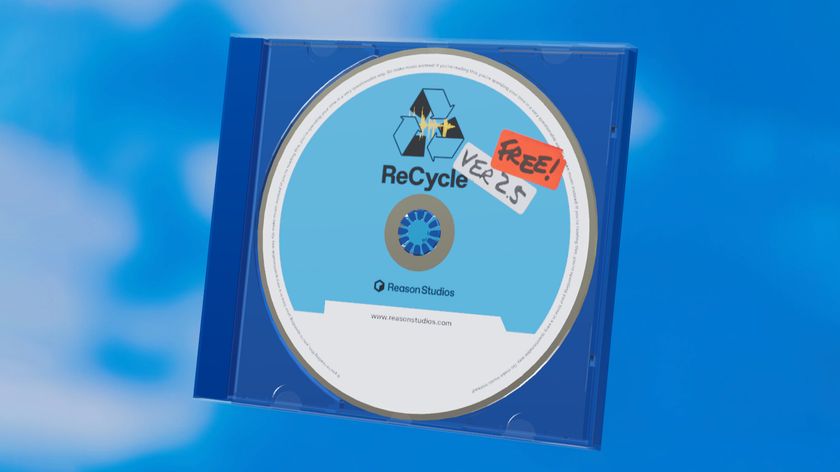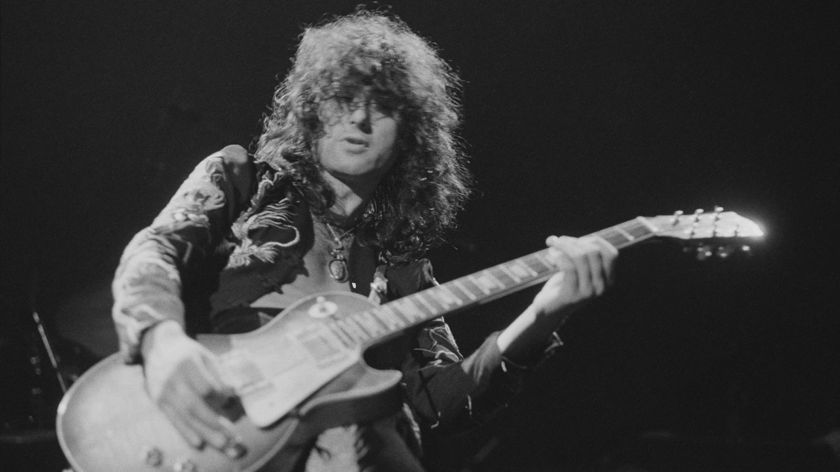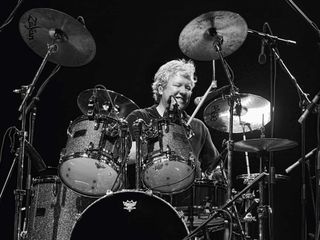
Chris Frantz's top 5 tips for drummers
Chris Frantz admits that he’s not always a demon when it comes to honing his drum chops. In fact, on the day we speak he reckons that he hasn’t touched his set in at least a month. “I really need to get back to it soon,” he says. “My right foot starts to go if I don’t practice. And you know, a drummer needs to have that kick drum working.”
Practice for Frantz usually means playing with other musicians, namely his wife and partner in both Talking Heads and Tom Tom Club, Tina Weymouth. “Tina and I will work on some stuff,” Frantz says, “but we both play accompaniment instruments, drums for me and bass for her. So we need to jam with other people. To me, that’s the best form of practice because it doesn’t feel like work.”
Computer love
When not seated behind his actual kit, Frantz likes to play around with another rhythmic friend – a drum machine. “It always surprises me when I hear drummers say how they hate drum machines,” he says. “They’re so useful.
“It always surprises me when I hear drummers say how they hate drum machines,” he says. “They’re so useful"
“There are some things you can create electronically that you might never be able to physically play, but you can also write simple, sweet parts that you can then take to the kit. It’s a good way of practicing, too. Anything that gets you away from the usual way of doing things is something you should embrace.”
A solid piece of advice. And on the following pages, Frantz offers five other top tips for drummers.
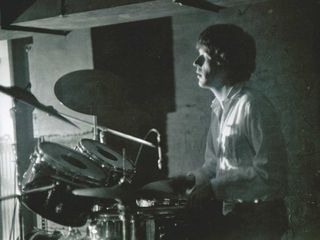
Pay no attention to the movie Whiplash
“I remember telling Tina, ‘Hey, there’s this nice movie about drummers. Let’s go see it.’ I didn’t have a lot of information about it at the time. So we went to see it, and very soon into it I realized that it wasn’t going to be my thing.
"I had good music teachers when I was a kid. They didn’t humiliate and bludgeon me. The only abusive teachers I ever had were in mathematics, not music"
“Bless his heart, I know people love him, but I just can’t dig Buddy Rich. If I had to pick a big band drummer that I would look to, it would be Gene Krupa, not Buddy Rich. Buddy seemed to have as many bad qualities as good ones. But that’s just my view – many people think he’s the ultimate.
Torture
“Beyond that, the film was torture for both me and Tina. I had good music teachers when I was a kid. I started playing drums in the public school system, and my teachers were kind and thoughtful. Once in a while they’d get on me, but they were encouraging and helpful. They didn’t humiliate and bludgeon me. The only abusive teachers I ever had were in mathematics, not music. [Laughs]
“I was impressed with the young actor [Miles Teller] who played the lead – he did a lot of drumming quite well. But the teacher, played by J.K. Simmons, he was like the drill instructor in Full Metal Jacket. So I’ve seen that shtick but in a much better movie. This wasn’t fun; it was torture. If you’ve got any sensitivity and love for music, this will bring you no joy.”
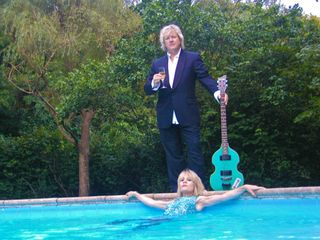
Art school may be better training than music school
“One great thing about our band, Talking Heads, was that we were taught in art school that it’s OK to be derivative of something else. Be strongly influenced, but if you want to be taken seriously ever, you have add something unique, a quality that’s yours. I don’t know if music schools teach you that kind of thing, but we sure got that in art school.
“Art school is a good breeding ground for people who have an outlook that’s unique unto themselves"
“Some of my favorite bands had members that came from art school, starting with The Beatles and the Stones and going right on to some of the UK punk bands. Ian Dury was an art school creature, as was Mick Jones from The Clash.
Breeding unpredictability
“Art school is a good breeding ground for people who have an outlook that’s unique unto themselves. You meet people who want to do things that are surprising and unpredictable.
"I have friends who went to music schools, and they say that the really good people never graduated because they got a gig and had to quit.”

Study Stax
“When I was growing up and starting to play drums, my idols were Ringo Starr and Charlie Watts. Then I discovered soul music and started playing along to those records, and I realized, ‘Oh, man, this is different.’ The feel wasn’t anything like what I was hearing from the other hits of the day.
“Al Jackson Jr., the drummer on the great Stax records, is the best"
“Al Jackson Jr., the drummer on the great Stax records, is the best. People talk about minimalism, and when it comes to taking that mindset to the drums, you’re really talking about Al.
"He had such a great feel – he really made every note count. Any record he played on swung like crazy. His parts were simple, and he was a brilliant time keeper. But it was more than that: He just knew what the music needed, so that when he hit the snare a certain way, it was as important as a word in the lyrics.
Beautifully sexy
“Booker T. and the MGs was my introduction to Al Jackson Jr., but then I went back and listened to what he did on records by Otis Redding. He also played on a lot of the early Al Green songs. That stuff is just flawless. What a beautifully sexy feel he brought to those records.
“If you’re a young drummer and you want to check out music that’s gonna make you feel good, listen to the Stax catalog and dig into Al Jackson Jr. You’re going to experience a lot of great music, and your drumming might take on a nice, sexy sound. Who wouldn’t want that?”

Listen thoughtfully to the band and the song
“Whether you’re playing live on stage or in a recording studio, it’s important to know what the other people are doing – A) so you don’t step all over them, and B) so you can support and hopefully enhance what they’re doing.
"Think about your bandmates and be a part of the team"
“If you’ve ever tried to play another instrument other than the drums, and I have, it’s hard. The guitar is hard. Keyboards are hard. To be really great on those instruments, that’s tough work.
"You don’t want to ignore what your bandmates are doing; you need to think about what they’re playing and work to amplify and enhance their contributions to the music. That’s your contribution.
Teamwork pays
“Some drummers are overly athletic and aren’t really listening to what’s going on. They’re hitting the drums, but they’re not really focused on the music as a whole and what the other people are doing.
"Think about your bandmates and be a part of the team. Your playing will change a bit, sometimes in subtle ways, but you’ll be contributing in a meaningful way.”

Be a songwriter as well as a drummer
“This advice is more from a career standpoint. I have to be honest: I’ve never written a song by myself, at least nothing that’s been recorded.
“I would encourage drummers to try another instrument and sit down with other people and help them finish off some songs"
"I’ve always had a collaborator, whether it was Tina or David Byrne, Jerry Harrison and Tina. I’ve always been a songwriting partner. But hey, that’s where money comes from, especially if you’re lucky enough to have co-written some hits in the ‘80s.
Don't sell
“I would encourage drummers to try another instrument and sit down with other people and help them finish off some songs. On many Talking Heads records, a lot of the songs were created by four people sitting down and jamming. Eventually, the jams were refined to where they were three- or four-minute songs.
“Sure, it’s important to be good on your instrument, but try to work on being a songwriter. Those royalties can add up. And don’t sell your publishing. It’s tempting sometimes, but don’t do it.”

Joe is a freelance journalist who has, over the past few decades, interviewed hundreds of guitarists for Guitar World, Guitar Player, MusicRadar and Classic Rock. He is also a former editor of Guitar World, contributing writer for Guitar Aficionado and VP of A&R for Island Records. He’s an enthusiastic guitarist, but he’s nowhere near the likes of the people he interviews. Surprisingly, his skills are more suited to the drums. If you need a drummer for your Beatles tribute band, look him up.

“I’m sorry I ruined your song!”: Mike Portnoy hears Taylor Swift's Shake It Off for the first time and plays along... with surprising results

“Nile's riff on Get Lucky is a classic example of a funk riff, where the second of each 16th-note duplet is slightly delayed”: Locking down the theory of groove

“I’m sorry I ruined your song!”: Mike Portnoy hears Taylor Swift's Shake It Off for the first time and plays along... with surprising results

“Nile's riff on Get Lucky is a classic example of a funk riff, where the second of each 16th-note duplet is slightly delayed”: Locking down the theory of groove
